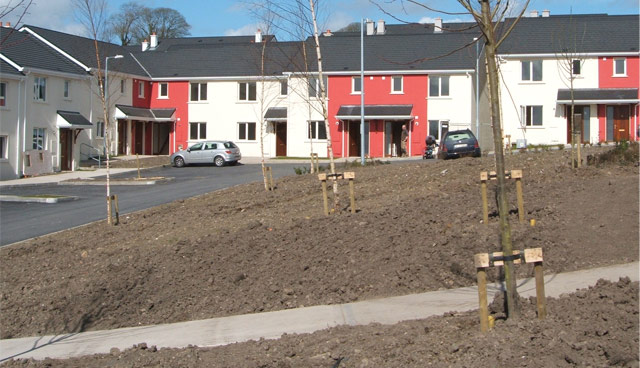
Research — Examine. Inform. Enable.
1st May 2018
Land availability
1st August 2018Investing in Cork’s social housing

Cork City Council’s Director of Service, Housing and Community Valerie O’Sullivan believes that the current focus on the ‘crisis’ dimension to Ireland’s housing challenge overlooks many of the good news stories associated with the myriad developments taking place on the ground.
“We are getting on with the job of increasing our social housing stock. The money from the Department of Housing is available to make this happen. But it takes time to get from that stage to the final phase of getting new homes completed.”
Speaking at the recent eolas Housing Conference, O’Sullivan discusses at length the difference between what constitutes a new house and a new home. “We are in the business of developing new homes. This entails making adequate provisions for community development.
“We know from history that building new houses without the accompanying schools, services and employment opportunities does not work.”
Turning to the issue of homelessness, O’Sullivan explained that simply providing people with a roof over their heads is not a solution in all cases. “Homelessness is a very complex issue and it takes a very co-ordinated approach, involving a range of public bodies, to ensure that it can be successfully tackled in all instances.”
The aim of Cork City Council’s Housing and Community Directorate is to ensure that every household can obtain a dwelling of good standard at a price or rent it can afford. In order that the aim can be achieved it is important that unfit and overcrowded houses be eliminated, that the demand for houses be met as it arises, that the structural and environmental standards of housing be improved on a constant basis and that owner occupation be encouraged to the fullest extent compatible with national economic and social development.
The RAPID programme, an acronym for Revitalising Areas through Planning, Investment and Development, is currently being implemented in 51 areas across the country in an effort to target disadvantage and integrate services in local areas.
According to Cork City Council, “the focus is on people working together, to make things happen through the combined efforts of the community, the voluntary sector, the City Council, Cork City Partnership, Cork Local Drugs Task Force, the VEC, FÁS, the Gardaí and local Councillors.”
O’Sullivan confirmed that contractors are an integral part of the housing development chain in the Cork area. “All of our current projects are joint ventures, involving a range of developers,” she explained.
A case in point is the recent announcement regarding the decision by Cork City Council to sign a contract with Conack Construction on a €16 million social housing scheme. The project will provide up to 65 new homes, making it one of the largest schemes in the country.
We also need to ensure that all new housing developments take account of future needs. The demographics of Irish society are changing.
A total of 32 three-bedroom houses, 24 two-bedroom houses, four two-bedroom maisonettes, three two-bedroom apartments and two four-bedroom houses will be built at Deanrock in Togher. A community building is also to be developed on the site.
Designed by Cork City Council’s Architects’ Department, the Deanrock housing will be built to an A energy rating, which includes top quality insulation, air tightness and photovoltaic panels to reduce heating and electricity bills for tenants. Stoves will also be installed as a back-up heating system. Construction on the site started recently with the scheme expected to be delivered at the end of 2019.
Cork City Council has approximately 9,000 rented properties in its ownership. Every year, a number of new houses are built and a number of houses are also sold to existing tenants under the Tenant Purchase Scheme. An assessment of housing needs is carried out by the Local Authority every three years to establish housing requirement in the area.
“There are currently 210 vacant properties over which the city council has responsibility,” said O’Sullivan. “Of these, 140 are currently under repair, with 48 about to be handed over to new occupiers. This all adds up to an overall vacancy rate of 2.34 per cent. This is well below historic levels.”
O’Sullivan pointed to the changing role of Cork City Council as a housing provider. “Increasingly, we are expected to be a housing enabler and facilitator,” she said. “Gone are the days when the council was simply deemed to be a housing provider. This is a direction of travel which must be discussed at both government and local authority level.
“The good news is that Cork City Council continues to invest in the provision of new, social housing throughout our catchment area. A priority area is the provision of housing for young people as they come out of fostering or the care system. We specifically want to ensure that housing provision is available for those young people wishing to follow third level educational courses.”
O’Sullivan believes that the City Council must be provided with adequate funds to ensure the upkeep of its current housing stock. “A review of all our properties is long overdue,” she added.
“Only in this way can we accurately assess what repair and regeneration works are required in order to maintain the housing that we have control over is maintained in good condition. We also need access to the funding required to make all of this happen. And delays in this regard will only add to the cost of the work that will be required further down the road.”
O’Sullivan said that government must regard housing as a form of infrastructure. “If this was the case, then we would have ongoing investment in new homes. The current policy of waiting until there is an upturn in the economy and then committing to new housing developments makes no sense at all.
“We also need to ensure that all new housing developments take account of future needs. The demographics of Irish society are changing and, obviously, we need to take account of this in planning for future housing provision.”
O’Sullivan fully supports the principle of increased housing density within urban areas. “And we want to go down this road as it will lead to more effective regeneration” she explained.“But the only problem is that contractors cannot make a profit on apartments at the present time. And until government takes steps to change this situation, the council has no option to go down the route of investing in traditional housing developments.”
O’Sullivan is quick to emphasise that she believes that local authorities in Ireland are doing a good job when it comes to committing to social housing. “We don’t need additional bureaucracy. The current system is working. All that it takes is the commitment of an authority’s chief executive to make housing a priority. Policy must be based on the three key commitments: inclusion, affordability and sustainability.
“Social housing developments work when those involved make a commitment to developing sustainable communities. Simply, putting up lots of new houses in specific areas is an approach that is destined to failure.”






